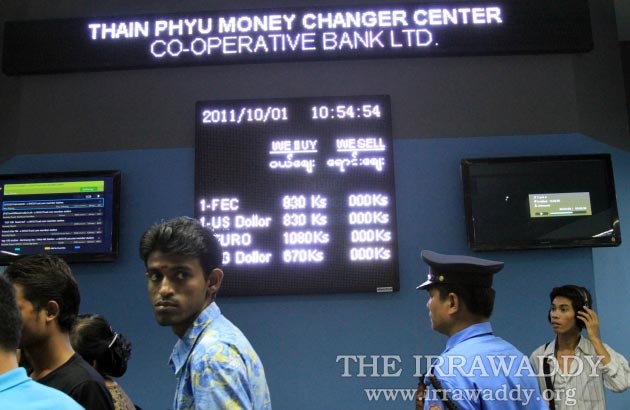Floating Toward Honesty: How Burma’s Bent Finances Can Go Straight

A more independent central bank will soon have to address the issue of repaying these debts, a satisfactory resolution of which will be vital to qualifying for much-needed new loans and grants for urgently needed new basic infrastructure such as electricity generation and distribution, roads and revitalizing community programs.
“[Burma] increasingly appears open for business… Major reforms, however, are still needed if economic modernization and progress are to succeed,” said the Netherlands-based social policy think tank Transnational Institute in a new assessment.
“Among needed changes are a working investment law, a just land policy, strong social and environmental safeguards, a functional central bank, a proper exchange rate, an end to cronyism, poverty mapping, local development funds, and participatory planning that fosters good governance and public consultation on development issues,” the Institute said.
The London Financial Times newspaper warned recently that with foreign companies being stampeded by “new economic frontier” media headlines there is a very real danger that “aid will pour into Myanmar faster than it can handle it.”
“Both the pace of re-engagement and the amount of aid flowing into the country need to be carefully monitored,” the paper said.
A number of economics observers have cautioned that concurrent with financial reform, Burma needs to quickly introduce sound investment protection laws—an issue the Japanese government has emphasized will be a key element of its negotiations with the Burmese government linked to future loans.
“Only with astute financial management can [Burma] hope to liberalize its currency while maintaining macro-economic stability,” said the chairman of the Singapore Institute of International Affairs, Simon Tay, commenting on Naypidaw’s request to the Singapore government for technical assistance and training of Burmese personnel in trade, investment law and trade practices.
Singapore would certainly be a better model to follow than many of Burma’s other neighbors.
« previous 1 | 2 |
- The ‘Virtuous Circle’ of Carrot & Stick Sanctions
- Suu Kyi Curbs Election Campaign After Falling Ill
- Burma Business Roundup (Saturday, March 24)
- Sea Tribunal Ruling: Bangladesh’s Gain, Burma’s Paying
- Burma Business Roundup (Saturday, March 17)
- End Near for Burma's Dual Currency Exchange
- Burma Business Roundup (Saturday, March 19)
- Chinese Trade Expo to Focus on Burma
- Dawei Port in Doubt with Bangkok Hub Plan
- Can Burma Re-Open Asean Free Trade Talks with EU?
